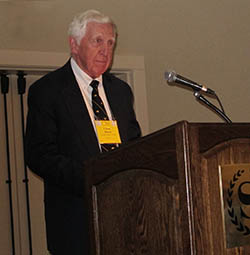Ron Stroud Accepts Aristeia Award at AIA Annual Meeting

Ron Stroud, Klio Distinguished Professor of Classical Languages and Literature Emeritus at the University of California, Berkeley, accepted his Aristeia Award at the January 2013 Archaeological Institute of America (AIA) Annual Meeting in Seattle. Many in attendance were connected to Professor Stroud either as a student, colleague, mentor, or friend. Jeremy McInerney, Professor of Classical Studies and Department Chair at the University of Pennsylvania and a former student of Professor Stroud's, brought the audience nearly to tears with his from-the-heart introduction. McInerney said of the tribute, "He's a humble man and is probably finding this excruciating. Tough!" Then Professor Stroud took the stage to accept the award from ASCSA Alumni/ae Association President Bill Hutton and thanked many, especially his wife and colleague of many years:
"When I got off the boat in Piraeus in September of 1959 and made my way to Souidias Street, I had no idea that the American School would have such a deep and lasting impact on me for the rest of my life. Tonight, after almost 55 years of close association, I am simply overwhelmed by this magnificent award. I want to thank all the officers and members of the Alumni Association and everyone connected with the Aristeia award for honoring me in this way.
I also owe many thanks to many people. First, to my teacher Kendrick Pritchett, who urged me while I was a graduate student in Berkeley that my best plan was to get to the American School as soon as I could and stay as long as possible. When I got there, I was very lucky to encounter Henry Robinson, who, as Director, appointed me to the wonderful post of Secretary of the School, which allowed me to stay for a total of four years. He also encouraged me to sink a few exploratory trenches on the north slope of Acrocorinth to see if there might possibly be a sanctuary of Demeter and Kore up there. I am deeply grateful to Henry for all his support in so many ways.
As Secretary, I had the honor of sharing an office for three years with one of the great teachers in the history of the School, Gene Vanderpool, and I'm deeply in his debt for his quiet example of humane scholarship. I'm reminded of Gene tonight, actually, for in his acceptance speech for the Gold Medal of the AIA, he observed that he didn't quite see why he should receive a gold medal for having so much fun for all those years. At this same time, I met one of my closest friends, Charles Williams, who was my best man in our wedding and with whom I worked on the Corinth Excavations. I owe Charles so much for his friendship and for his inspired leadership of a vigorous research program at this marvelous site. Also at this time, I began my long and happy collaboration with Nancy Bookidis. She taught me so much about excavating, how to draw sound inferences from what you dig up, and how to express the results of your research in clear, objective English prose. It is impossible adequately to express my gratitude to Nancy. To have co-authored a long book with her is one of the most rewarding experiences of my life.
I am also deeply grateful to the Managing Committee for appointing me Mellon Professor of Classical Studies in 1996 and to my friend John Camp for urging me to accept this post and for showing me how it should be done. These were golden years for which I am indebted to the School. What could be better than working with some of the best graduate students in our field while still having time and superb resources for carrying out one's own research—and all the while living in a marble house!
To all of these people and to many more, I owe so much more gratitude than I can ever express, but to no one more than to my dear wife, Connie. We met at the School, we courted at the School (in the early sixties, one courted, and courting in those days in gender-segregated Loring Hall presented a major challenge), and we married in Athens in a beautiful wedding. We excavated together on the sometimes fiercely hot slopes of Acrocorinth, and we sorted pottery together for what seemed like interminable weeks in the freezing cold Corinth Museum. In 1996, she nursed me through a potentially life-ending injury, and she has been a constant source of sound advice, love, and close support for what is now approaching half a century. I cannot tell you how much I owe to her, but I can tell you one thing for certain: without Connie, there would never have been an Aristeia Award for Ron Stroud."